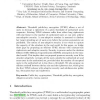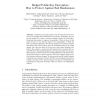7 search results - page 1 / 2 » Adaptively-Secure, Non-interactive Public-Key Encryption |
AFRICACRYPT
2010
Springer
13 years 3 months ago
2010
Springer
TCC
2005
Springer
13 years 10 months ago
2005
Springer
Adaptively-secure encryption schemes ensure secrecy even in the presence of an adversary who can corrupt parties in an adaptive manner based on public keys, ciphertexts, and secret...
ICICS
2010
Springer
13 years 2 months ago
2010
Springer
Threshold public-key encryption (TPKE) allows a set of users to decrypt a ciphertext if a given threshold of authorized users cooperate. Existing TPKE schemes suffer from either lo...
ASIACRYPT
2009
Springer
13 years 8 months ago
2009
Springer
Abstract. Public-key encryption schemes rely for their IND-CPA security on per-message fresh randomness. In practice, randomness may be of poor quality for a variety of reasons, le...
CRYPTO
2011
Springer
12 years 4 months ago
2011
Springer
In CRYPTO 1997, Canetti et al.put forward the intruiging notion of deniable encryption, which (informally) allows a sender and/or receiver, having already performed some encrypted...


